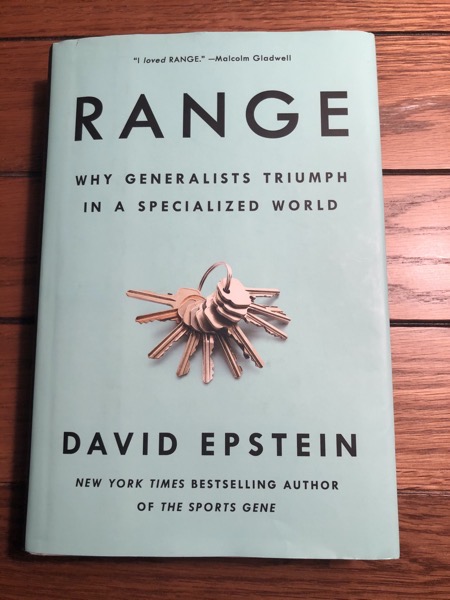This is a post about education, personal development, and why you should be a generalist.
Tiger Woods was trained almost from the cradle for one thing–to be the greatest golfer.
Roger Federer tried many sports. He loved soccer. Even though his mother was a tennis teacher, he didn’t pick up tennis until his early teens. Other kids had been playing for years by then. He soon passed them by and into his thirties is a dominant tennis star.
You need to be good at something, but it is good to be interested and experienced in many things.

I have a book to recommend. Range: Why Generalists Triumph in a Specialized World, by David Epstein. This book will help you learn to live a fuller life–and help you bring up your kids and encourage your grandkids.
Life in the industrial age, as well as in some previous eras, was composed of patterns. You could be trained to recognize patterns and adapt and become skilled at them. These are called “kind” learning environments. Kids excel who see and repeat the patterns.
Life today is what a psychologist call a “wicked” learning environment. Here, the rules of the game are often unclear or incomplete, there may or may not be repetitive patterns, and they may not be obvious, and feedback is often delayed, inaccurate or both. In most devilishly wicked learning environments, experience will reinforce the exact wrong lessons.
So, let’s look at responding to today’s “wicked” learning environment. “The bigger the picture, the more unique the potential human contribution. Our greatest strength is the exact opposite of narrow specialization. It is the ability to integrate broadly.” This all sounds great. But what about what I read in the news as the “typical Trump voter” who is a worker trained in the old way watching his job being replaced. And who is the leader who is poised to take them to this next level? Well, no one. Just leaders who play to their fears.
There are some courageous leaders changing the system for educating young people so that they can thrive in this new environment. We just have to have more of that. More people guiding young people—and older people, as well—need to take into practice this advice from psychologist and creativity researcher Dean Keith Simoton, “Rather than obsessively focusing on a narrow topic, creative achievers tend to have broad interests.” Modern work demands knowledge transfer—the ability to apply knowledge to new situations and different demands. In my life I have worked with both highly educated engineers AND high-school-educated technicians who exhibit this. More must be encouraged.
For those who, like me, studied broadly as an undergraduate and didn’t care much about grades, take this observation from professor and researcher James Flynn who was “bemused to find that the correlation between the test of broad conceptual thinking and GPA was about zero. Flynn, “The traits that earn good grades at [the university] do not include critical ability of any broad significance.
Here is a tip for those who teach at any level. When asking a student a question, force them to answer, even if it is wrong. Then just force them to answer again. And again. Until they get it right. Giving them hints to guide a correct answer quickly provided fewer long-term results than the first method. “Repetition is less important than struggle.”
Oh, and in a test of forecasting, experts were far worse than “amateurs” getting it right!
How does one adapt? By reading widely. Pursue several interests. That will be the human triumph in an age of robots.





